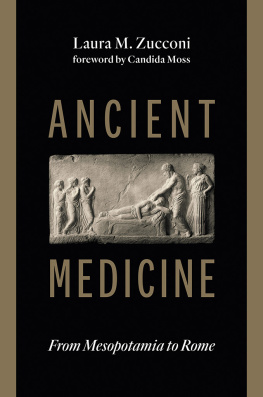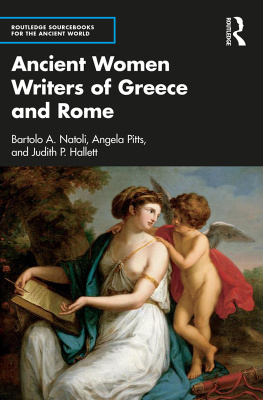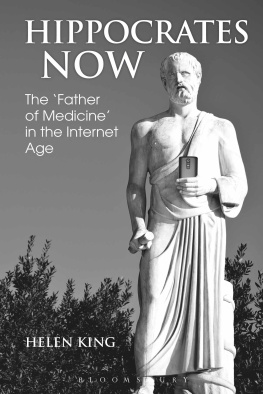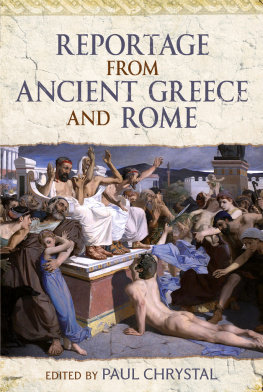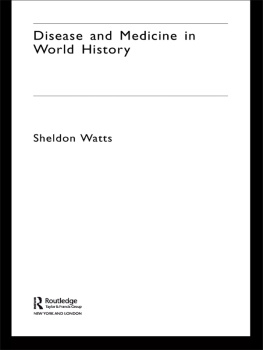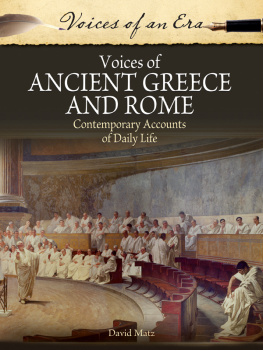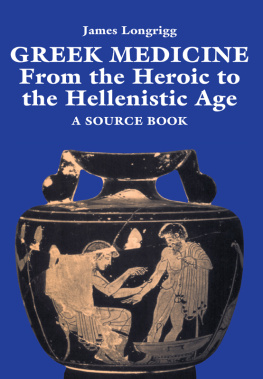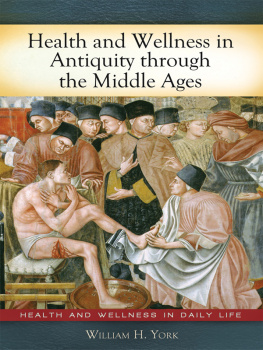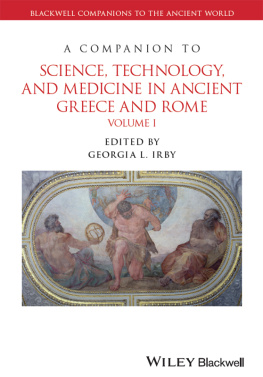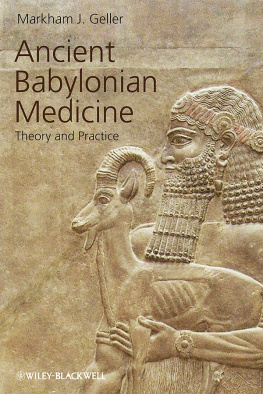Ancient Medicine
From Mesopotamia to Rome
Laura M. Zucconi
WILLIAM B. EERDMANS PUBLISHING COMPANY
GRAND RAPIDS, MICHIGAN
Wm. B. Eerdmans Publishing Co.
4035 Park East Court SE, Grand Rapids, Michigan 49546
www.eerdmans.com
2019 Laura M. Zucconi
All rights reserved
Published 2019
252423222120191234567
ISBN 978-0-8028-6983-8
eISBN 978-1-4674-5751-4
Library of Congress Cataloging-in-Publication Data
Names: Zucconi, Laura M., author.
Title: Ancient medicine : from Mesopotamia to Rome / Laura M. Zucconi.
Description: Grand Rapids : Eerdmans Publishing Co., 2019. | Includes bibliographical references and index.
Identifiers: LCCN 2019005484 | ISBN 9780802869838 (hardcover : alk. paper)
Subjects: LCSH: MedicineReligious aspectsHistory.
Classification: LCC BL65.M4 Z829 2019 | DDC 610.938dc23
LC record available at https://lccn.loc.gov/2019005484
To Dr. George Robert Zucconi
Contents
Medicine seems to us to be a liminal practice. In modern societies health is easily acquired and medical practice easily sequestered into sanitized, brightly lit spaces that are scented with antiseptic and bounded from the ordinary world. This conception could not be further from the ancient world, in which broken limbs never fully healed; aging brought wisdom, impaired vision, and hearing loss; and the population as a whole was vulnerable to a whole host of diseases deemed minor today.
Medicine in the past, therefore, was not only, at certain points in time, a distinct techne or profession, but it was also the domain of the priest, the magician, and the cook. It was conducted in sanctuaries as well as around the hearth. The biting awareness of the frailty of human existence rendered healthcare a central component of the human experience. But even as all ancient peoples were forced to think about the tenuousness of good health, they did not always do so in the same way. We often, erroneously, think of Hippocrates as the founder of medicine and push to the side those medical practices that predate him while dismissively labeling them as superstition or magic.
Part of the problem is that few modern scholars possess the linguistic, archaeological, and historical skill sets to evaluate ancient cultures, let alone differentiate or even adequately distinguish one from another. The small steps between regions and cultures that would have been traversed on a daily basis by ancient people are less easily followed by modern scholars, whose areas of expertise are balkanized into specializations based on linguistic competency and geographical region. The experience of an ancient farmer living on the border is inaccessible to those who do not have the linguistic abilities or breadth of knowledge to speak of Egyptian, Mesopotamian, Persian, and Roman medicine.
More problematic is the sense that many scholars of the ancient world have limited interest in understanding medicine beyond the exalted status played by Hippocrates and his Greek- and Latin-speaking heirs. A whole subfield of medical literature published in the hallowed pages of the JAMA and the Lancet is devoted to tracing the evolution of thought from Hippocrates to the present with hardly a sideways glance at the practices of the ancient Levant.
It is into this complicated web of geographical, social, and historical boundaries that Ancient Medicine: From Mesopotamia to Rome steps. Laura Zucconis work performs a welcome and desperately needed intervention in a field of literature in which experts in Greco-Roman religion are unable to speak to specialists in Hittite medicine. She adeptly navigates the difficult waters of sources, textual traditions, material culture, and ancient theories and distils the medicine of the ancient world into easily digestible chunks. Noting, in the traditions of the pseudo-Hippocratic texts Airs, Waters, and Places, that medical theory is deeply connected to geography and lived experience, she introduces cultures, regions, and medical praxis in a way that is accessible even to someone who knows almost nothing about the ancient world and even less about medicine.
Ancient Medicine does more, however, than fill the sizeable gap in scholarly histories of medicine and is not content, as we should not be either, with rounding out traditional histories of medicine so that Persians, Hittites, Canaanites, and Egyptians are represented alongside figures like Hippocrates and Galen. Zucconi takes seriously the underlying logic of the various thought-worlds she examines. Rather than derisively dismissing what we might call unsuccessful treatment methods as historical curiosities, she seeks to understand the rationale underpinning the medical practices she examines.
She reveals the astonishing fact that ancient medicine was a rich tapestry of practices that varied widely across the ancient Mediterranean. Rather than striving to uncover the seeds of modern medical practice as if they were discoveries accidentally stumbled upon by ancient practitioners, we should examine ancient medical thought on its own terms, in the variegated ways in which it was practiced and theorized and the multiplicity of contexts in which it was performed. As the book builds, we learn not only about medicine but also about cosmology, community, institutionalized religion, philosophy, the rhetorical boundaries that divorce medicine from magic and religion, and the role of warfare in propelling, supporting, and crafting healing practices. Even as her chapters create ever-expanding pools of knowledge, there is nothing simplistic here: just as Jupiter is not merely Zeus renamed, Zucconi reminds us, so too the medicine of the Romans is not merely a recapitulation of Greek and Egyptian healthcare.
As the related fields of disability studies and history of medicine have grown up alongside one another, it is rare that the work of the accomplished historian has been successfully infused with the observations of the critical theorist. In the introduction to her book Zucconi proves that she is as methodologically thoughtful as she is historically and philologically qualified. It takes rare ability and a mature historical consciousness to provide such a nuanced and rigorous view of medicine in the ancient world. Though Zucconi complicates our beloved cultural image of Hippocrates as the father of medicine, we will be wiser for it and thank her for serving as our guide.
December 5, 2018
PROF. CANDIDA MOSS
Cadbury Professor of Theology
School of Philosophy, Theology & Religion
University of Birmingham
Writing the acknowledgments for a work of this scope is a rather daunting task, since so many in the last seven years have contributed in a variety of ways to its completion. I would like to mention a few by name, with my apologies to any whom I may overlook; any mistakes in this work are all my own. Candida Moss, Joel Baden, Rebecca Raphael, and JoAnn Scurlock, for not only their own work in the field of ancient medicine, health care, and disability, but also for their time and friendship in helping guide my research. My colleagues Drs. Lisa Rosner, William Lubenow, and the rest of the history faculty at Stockton University, for their mentorship, support, encouragement, and lively debates. I am indebted to Wolfson College and the McDonald Institute for Archaeological Research at the University of Cambridge for their research support and providing a home away from home. The editors Allen Myers and Trevor Thompson at Eerdmans Publishing graciously and patiently allowed me to run with the idea of a history of ancient medicine. On a more personal note, I am forever grateful for the friendship and wing nights with Margaret Lewis and Mike Lague, for Nishtha Madans welcoming family, and finally for Manish Madan standing in my office doorway making sure I finish (despite also distracting me with fabulous Bollywood suggestions).

